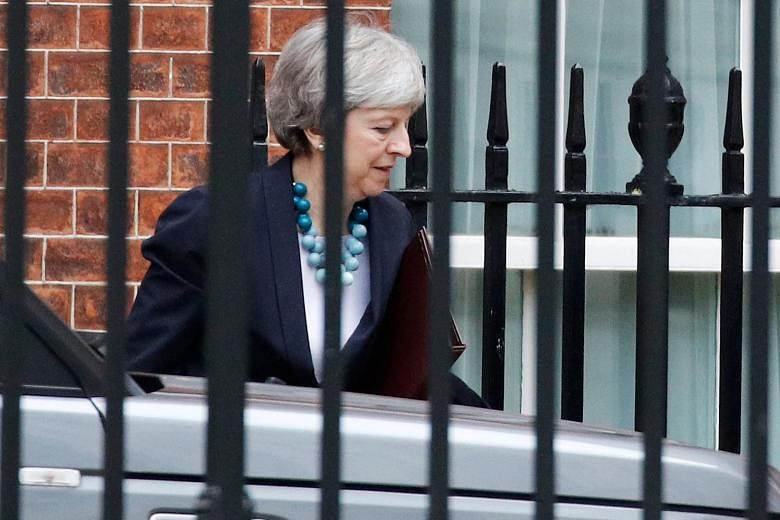LONDON • British Prime Minister Theresa May has abruptly pulled a parliamentary vote on her Brexit deal, throwing Britain's plan to leave the European Union (EU) into chaos after she admitted that she faced a rout.
Mrs May's move on the eve of a crucial parliamentary vote opens up an array of options for the United Kingdom, including a disorderly Brexit with no deal, another referendum on EU membership or a last-minute re-negotiation of Mrs May's deal.
Announcing the delay yesterday, Mrs May was laughed at by some lawmakers when she said there was broad support for the deal and that she had listened carefully to different views - the result of 18 months of tortuous negotiations.
"If we went ahead and held the vote tomorrow, the deal would be rejected by a significant margin," Mrs May told Parliament, adding that she was confident it was the right deal.
"We will therefore defer the vote scheduled for tomorrow and not proceed to divide the House at this time," she said, adding that the UK would step up planning for a no-deal Brexit.
Mrs May accepted there was concern among lawmakers about the Northern Irish "backstop", an insurance policy aimed at avoiding a return to border checks between the British province and Ireland that could threaten a 1998 peace accord.
Her critics, both supporters of Brexit and its opponents, have rejected the open-ended backstop, which could require Britain to accept EU rules indefinitely, long after it gives up any say in drafting them. Mrs May said the broader question was whether Parliament wanted to deliver on the will of the people for Brexit or open up the divisions in the world's fifth-largest economy with another referendum.
Mrs May's own position is uncertain, and she could face a swift challenge. Main opposition Labour Party's leader Jeremy Corbyn called on her to make way for the opposition party if she could not take on board the fundamental changes required to get her deal through Parliament.
"The Prime Minister is trying to buy herself one last chance to save this deal. If she doesn't take on board the fundamental changes required, then she must make way for those who can," he said yesterday.
The decision to halt the vote came just hours after the EU's top court ruled that Britain could unilaterally withdraw its decision to leave the bloc on March 29.
The Prime Minister said yesterday she would do all she could to secure further assurances from the EU on the backstop arrangement.
"I will go to see my counterparts in other member states... I will discuss the clear concerns that this House has expressed," she told Parliament, adding that she would seek "to secure further assurances".
But EU officials said the bloc will not allow her to reopen negotiations over the divorce deal.
Brexit is seen as Britain's most significant decision since World War II. Supporters say it frees Britain to trade more widely with the rest of the world; opponents fear it will divide the West as it grapples with the unconventional American presidency of Mr Donald Trump and growing assertiveness from Russia and China.
The ultimate outcome will shape Britain's US$2.8 trillion (S$3.8 trillion) economy, have far-reaching consequences for the unity of the UK, and determine whether London can keep its place as one of the top two global financial centres.
More than two years after the 2016 referendum on Brexit, the UK remains divided on how or even whether it should leave the club it first joined in 1973. Some 17.4 million voters, or 52 per cent, backed Brexit while 16.1 million, or 48 per cent, backed staying in the EU. Polls show few voters have changed their minds despite warnings of economic turmoil.
REUTERS, AGENCE FRANCE-PRESSE


